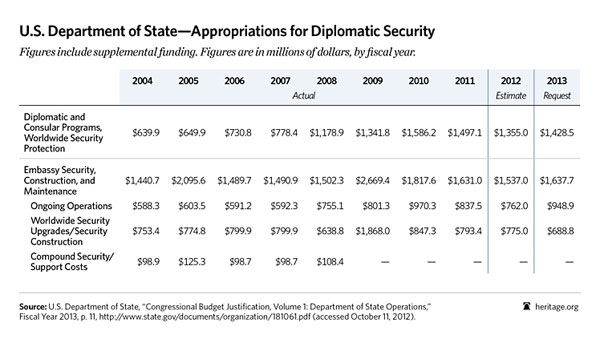There has been some back and forth between Republicans and Democrats over funding for security in Libya in the wake of Ambassador Chris Stevens’s death. Republicans have questioned whether the State Department had adequate security to protect the ambassador, and Democrats have countered that Republicans tried to cut funding for embassy security. What does the budget record show?
According to the fiscal year (FY) 2013 Congressional Budget Justification Department of State Operations (p. 11), overall funding for those programs has increased sharply over the past decade. Indeed, Worldwide Security Protection is more than double what it was a decade ago. Despite reductions from budget peaks in FY 2009 and FY 2010, both budget lines are higher than in FY 2008. (continues below chart)
Comparing FY 2011 actual funding versus the FY 2012 estimate, there appears to be a reduction in Worldwide Security Protection and Embassy Security, Construction and Maintenance. But that reduction does not account for additional funding in FY 2012 from Overseas Contingency Operations funds amounting to $236 million for Worldwide Security Protection (p. 63) and $33 million for Embassy Security, Construction and Maintenance (p. 467). As a result, total funds for Worldwide Security Protection for FY 2012 are estimated to be $94 million higher than in FY 2011, while Embassy Security, Construction and Maintenance is estimated to be $61 million less than FY 2011. Together, there is a net increase.
In terms of people, the budget justification reported that Worldwide Security Protection had slightly fewer positions budgeted (1,777 in FY 2011 versus 1,707 in FY 2012) and Embassy Security, Construction and Maintenance had the same number of positions budgeted (1,014 for both years).
In its budget request for FY 2013, the Administration requested significantly more funding for embassy security—mostly through the Overseas Contingency Operations budget—but retained the same number of positions, apparently on the assumption that security staffing was adequate. Regardless, that budget, even if approved in its entirety, would have entered into effect after the events in Libya.
It is tempting to look for a scapegoat for the tragic events in Libya. However, if one exists, the overall budget for embassy security is not it. Funding for that purpose has risen sharply over the past decade. Moreover, the State Department has considerable latitude in allocating security funds based on current events and intelligence on possible threats. Why that latitude was not applied in Libya deserves further scrutiny.

